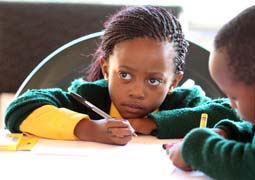
The benefits of integrating early childhood development into the Department of Basic Education featured high on yesterday’s departmental budget vote. This function was transferred to Basic Education from the Department of Social Development last month.
The Minister of Basic Education, Ms Angie Motshekga, promised that the integrated and coherent plan for early childhood development is a result of the government’s insistence that both departments work together on the matter.
She went on to say that a study undertaken by the DBE indicated that only 35 per cent of children are prepared for formal schooling. Minister Motshekga said improving reading in the early grades is at the heart of meaningful learning and a pre-Covid-19 report showed progress in this area. Now, however, South Africa has seen losses, similar to those experienced in other countries.
The Chairperson of the Portfolio Committee on Basic Education, Ms Bongiwe Mbinqo-Gigaba, said early childhood development’s move to the Basic Education department is an important policy shift that will strengthen early learning as a child’s cognitive development in early childhood has a significant impact on their future learning ability. However, “The inequalities of different ECD centres impact the most vulnerable in our society. The fact that children from privileged backgrounds have access to ECD facilities, which enhance their cognitive development at an early age, lays a solid foundation for schooling,” she said.
It will be important for the DBE to develop strong quality assurance systems and to support the development of early childhood development centres in disadvantaged areas that meet the required minimum norms and standards. The ECD budget provides for a grant of R1.2 billion for subsidies in order to provide for an increase in the number of children accessing subsidised services. This budget allocation is not sufficient, but it will go a long way in addressing the inequalities.
Regarding the Basic Education Laws Amendment (Bela) Bill, Ms Mbinqo-Gigaba said the committee has advertised the Bill for public comment. The Bill responds to various challenges affecting South Africa’s education system, such as additional regulatory powers to the minister to enable intervention, ensuring Grade R is compulsory and making school leadership responsible for tracing and reporting learners who have dropped out. She called on stakeholders to make inputs on the Bill that will enhance the basic education system.
Mr Baxolile Nodada of the Democratic Alliance expressed grave concern regarding learner drop-out rates and the manner in which these are captured on the system. He said the infrastructure backlog in schools in certain provinces needed to be urgently addressed and said the recent floods in KwaZulu-Natal and the Eastern Cape have exacerbated the situation. He further called on the DBE to establish an independent school monitoring authority in order to strengthen quality education.
The Economic Freedom Fighters’ Dr Suzan Thembekwayo raised concerns about the amount of unqualified teachers in the system, whilst the DBE has been “dragging its feet to pay teacher assistants who have been instrumental in keeping the lights on in our education system.”
Mr Siphosethu Ngcobo (Inkatha Freedom Party) said under-resourced schools have suffered the most during the Covid-19 pandemic. He also lamented the fact that pit latrines still exist in some schools.
Ms Marie Sukers of the African Christian Democratic Party focused her speech on the role of home school educators. She welcomed the department’s research in this field and highlighted the red tape that independent institutions must navigate to obtain registration. She claimed that independent institutions with fewer than 30 learners should receive 100% rebate. This should also apply to special needs school and low-fee independent schools.
The United Democratic Movement’s Mr Nqabayomzi Kwankwa indicated his party does not support the budget vote as the DBE for many years failed to secure a foundation of equal education for everyone in the country. This point was also taken up by Mr Shaik Emam of the National Freedom Party, who referred to big class sizes.
Mr Kwankwa together with Ms Désirée Van der Walt and Ms Sukers also highlighted the plight of learners with special needs and the lack of sufficient funding for this sector. Mr Ganief Hendricks (Al Jama-ah) highlighted the violence in communities that spills over into schools. He referred specifically to this week’s shooting in Manenberg on the Cape Flats and the Danville Primary school.
Rajaa Azzakani
20 May 2022

